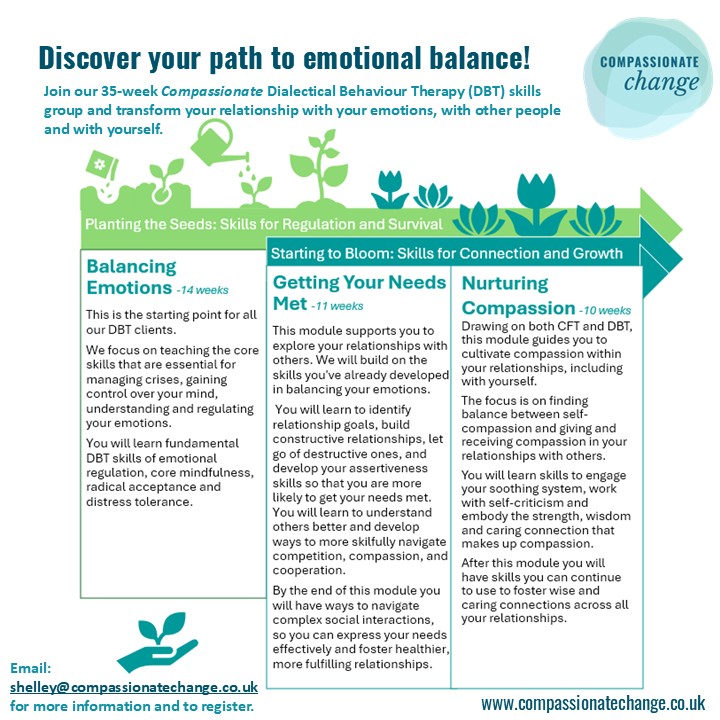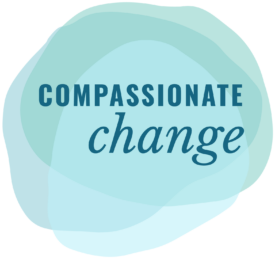DBT: Dialectical Behavioural Therapy
Join our DBT skills programme and start your journey to changing your relationship with yourself, your emotions, and important others in your life.
**Next intake is in September and we have a few places available**
Cost is £90 weekly - which includes a two hour and 15min skills group plus access to phone coaching during the week with the facilitators. With our comprehensive support we help you to generalise and practice the skills you're learning when you really need them.
Your first 14-week module is where we plant the seeds for your future with skills for regulation and survival. You will learn the core skills you need to start to take hold of your mind, survive a crisis, and develop the ability to skilfully regulate your emotions.
Contact us for more details and to reserve your place.
What is DBT?
DBT is an effective, evidence-based psychological therapy for people struggling with intense, overwhelming emotions. Psychologists call these patterns 'emotional dysregulation'. Experiencing emotional dysregulation can bring a range of associated difficulties in terms of behaviour, relationships, and feelings about oneself.
How can DBT help?
A DBT approach can help you learn to understand and connect skilfully with your emotions, as well as to balance the other difficulties that come along with overwhelming and out of control emotions.
DBT can help you find emotional stability, achieve your goals, and build relationships that feel balanced and connected - with yourself and with other people.
Often people coming to DBT find themselves with difficult behavioural patterns such as self harm, suicidal behaviour, binge eating, and substance abuse. In DBT, we understand these patterns as functional coping strategies. This means we do them because they serve some function, or purpose for us. They are often a 'solution' to unbearable experiences, such as difficult emotions. Unfortunately, coping in these ways often has unintended consequences, such as being dangerous, negatively affecting our health, relationship difficulties, negative feelings about oneself, and shame. In this way, problems can inadvertently escalate and get more complicated over time. The hopeful news is, that DBT offers a way to get unstuck from these harmful patterns.
Whilst we start by working to change these behaviours that are no longer serving you, DBT is an emotion focused approach. In DBT we aim to help you develop a wise way of working with your emotions, so you can build a life you feel is worth living.
Who is DBT for?
DBT is a therapy for people who struggle with intense and often overwhelming emotions, who have difficulties in relationships (with others and yourself), and who find that these problems interfere with your life satisfaction and functioning.
DBT was originally developed for people diagnosed with Borderline Personality Disorder (BPD; also called Emotionally Unstable Personality Disorder), though this diagnosis is not necessary for this therapy to be helpful.
Since it was developed in the early 1990s, DBT has been shown to be helpful for various difficulties (e.g. substance abuse, eating disorders, PTSD, C-PTSD, Bipolar disorder, ADHD, treatment resistant depression). DBT has an excellent evidence base and is recommended in the NICE guidelines for BPD.
What does DBT involve?
DBT is a multi component therapy, including:
- Weekly group skills training sessions,
- Telephone coaching to help skills generalisation, available 7/7.
- Weekly 1:1 sessions with your individual DBT therapist,
- A consultation team for therapists.
Full program DBT involves all components of therapy.
It is also possible to engage with a Skills Only DBT program of treatment. This is available to people who are presenting with a lower risk to themselves and could benefit from learning the DBT skills. This is popular amongst our clients and includes the skills group, access to coaching 7/7 with your therapists, and therapists attending our consultation team.
Learning these skills is at the heart of DBT and research says that both full program and skills only DBT are helpful approaches.
Stages of treatment:
DBT progresses through different stages of treatment:
Pre-treatment: This stage includes assessment, developing an understanding of your difficulties and goals, learning about DBT and testing out whether it'd be a good fit for you, and building a relationship with your 1:1 therapist.
- Stabilisation: This phase of DBT focuses on addressing behaviours that interfere with your ability to live, engage with therapy, and have a good quality of life. Skills to take hold of your mind (mindfulness), manage emotions, build healthy relationships, and tolerate distressing situations are all actively taught during this phase of therapy.
- Trauma: This phase of therapy involves emotionally processing traumatic and invalidating experiences. For clients with PTSD/ C-PTSD we can use DBT-PTSD or DBT-PE treatment at this stage.
- Reclaiming life: This phase of therapy is focused on building happiness, meaning, learning to trust yourself, and work on your individual goals.
How long does treatment take?
There is no set timeline for DBT and people may not move through the stages of DBT in a linear way.
Skills only DBT may take 9-18 months, depending on whether you'd like to complete one or two cycles of skills training. Our DBT group runs for 35 weeks over about nine months.
Full program DBT usually involves an initial commitment of 12 months (e.g. 46 x 1:1 sessions plus 35 x skills group sessions). A number of clients choose to continue 1:1 beyond completing their skills training, to continue working on building lives that feel meaningful and enjoyable and worth living.
Can DBT help with PTSD/ C-PTSD/ Trauma?
It is common for people who need DBT to have also experienced serious, traumatic events in their lives. In some cases, you might also be experiencing symptoms of Post Traumatic Stress Disorder (PTSD/ CPTSD). If this is the case, we can use a specialist form of DBT, which will help you safely work through your traumatic experiences and reclaim your life.
There are two versions of DBT which both have good evidence for PTSD/ CPTSD - these are called 'DBT-PE' and 'DBT-PTSD'. At Compassionate Change Ltd, we have specialist training in both of these models. Which might be most helpful for you is something you could discuss with your assessing therapist.
Trauma work happens in stage 2 of DBT - after we have helped you find stability and develop your skills and resources.
What support is available for family/ partners?
Receiving support and understanding from partners and families can go a long way to helping with recovery. Loved ones can play a vital role in creating a stable and caring environment for each other. They can also play an important role in supporting the hard work of change.
Sometimes families and partners will benefit from some direct therapeutic support themselves. This can take the form of a family or couples therapy session, a series of sessions, or of skills training for families or partners.
Mark is our specialist family therapist at Compassionate Change. He has years of experience in helping people find their way to compassionately being with each other and creating systems that support growth and development. He has special training in supporting families and couples and many years of using DBT principles to help relationship 'systems'.
By incorporating DBT principles, families and couples can learn to improve their communication, engage with conflict constructively (without avoiding or erupting), and together achieve more balance in emotions. Because DBT helps with mindfulness, you can learn to become more present, attentive and attuned in your interactions. Dialectical principles in DBT helps to foster empathy, deeper understanding of each other, and more compassionate connections.
How do I get started?
Reach out to us to discuss whether DBT might be a helpful approach for you. We are happy to answer questions you might have, as well as to book you in for an assessment to get started in working together.
Click the link below to submit an enquiry today.

DBT Skills Training
At the heart of DBT is skills training. This is usually offered within a group setting. Many people feel a little nervous about this, though it can help to know that this isn’t ‘group therapy’ in the traditional sense where you're expected to share all your struggles and personal history with the group. It’s more of a chance to learn the skills you’ve not had the opportunity to learn in your earlier life.
In DBT we support you to learn ways to take hold of your mind (mindfulness), ways to understand and balance your emotions (emotion regulation skills), ways to find balance in your relationships (interpersonal effectiveness), and ways to accept and tolerate painful situations and experiences that can not be changed in this moment (distress tolerance skills).
At Compassionate Change our DBT programme is unique as we also draw on the wisdom of compassion to add in some skills to help you develop a more compassionate relationship with yourself, as we know that many of our clients struggle with shame, self criticism and self care.
We teach skills in three ‘modules’, which range from 10-14 weeks each. Everyone starts with 14 weeks of distress tolerance and emotional regulation skills, as these provide the stable foundations for deeper change. You will then learn compassion and relationship skills in the two later modules (10-11 weeks each). The entire skills programme takes 35 sessions to complete. Some people wish to cycle through these skills twice to really get the hang of them.

If you'd like to find out how we can help you learn these DBT skills to support change in your life, please reach out using the link below and let's discuss what you need.
